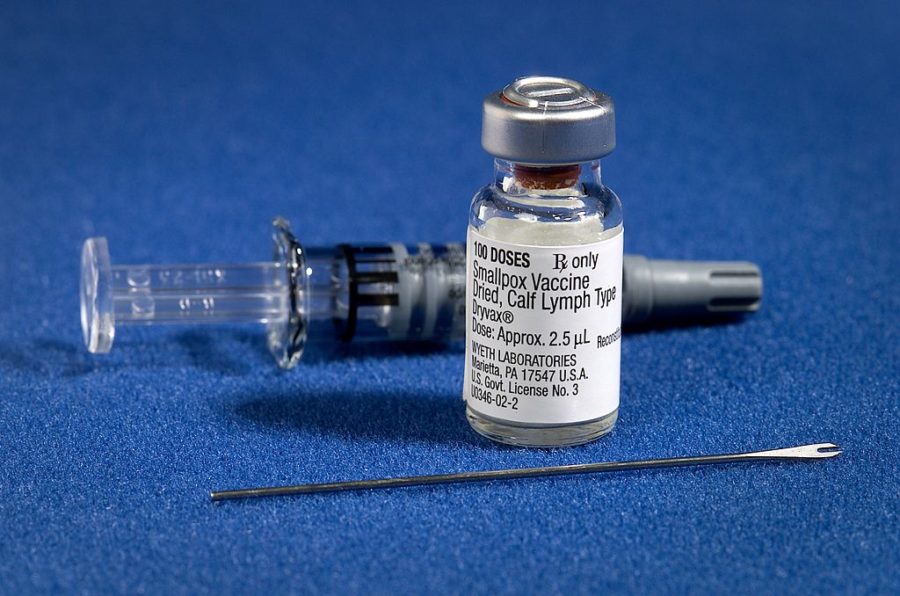Anti-vax Parents Need a Shot of Reality about Vaccine Exemptions
Opinion
James Gathany, CDC Public Library/Wikimedia Commons
Smallpox is one of the diseases, considered eradicated, that could be making a small comeback due to the anti-vaccine movement.
March 6, 2019
Although there is nothing unusual about a child getting vaccinated at certain stages of their life, some parents believe vaccines are useless, dumb, or even dangerous. There has been a constant debate on whether parents should be allowed to prevent their children from getting vaccinated. Those parents usually have medical, personal, or religious reasons for their kids to not get vaccinated. When children don’t get vaccinated, however, they pose a major threat to the rest of the surrounding area with contagious diseases.
All states allow the prohibition of vaccines on parent’s children based on required reasons by the state called exemptions. The exemptions in Pennsylvania are medical, philosophical, and religious. Medical exemptions are allowed if the vaccine itself has a quantiful amount of substances that could be detrimental to the child taking the vaccine.
With medical exemptions, parents come to the conclusion that whatever is being put into their child’s body is unsafe and harmful, often without further knowledge of the vaccine itself. The main argument for being against vaccines was also that parents believe that vaccines cause autism, which sprouted from a study in 1988 stating autism is linked to the vaccine that fought against the MMR. Many studies were taken to prove that there was no correlation, yet this is still a constant fear.
I can understand parents not wanting their children vaccinated if the vaccine is actually physically and mentally harmful; however, parents are focusing more on their personal beliefs like believing their child can become used to a disease and gain immunity as time goes by. These beliefs started when many parents began to feel concerned for the health of their child and wondered if vaccines are even any good. The intention of vaccines is to try to provide immunity for a disease, and according to research, vaccines almost always prevent the spread of most diseases.
I believe only medical exemptions should be completely allowed. One valid reason for a medical exemption is if the child has an immune system disorder by which the body attacks its own tissues. In these cases, the vaccine’s intent to protect is compromised.
I am, however, completely against are the philosophical exemptions. These exemptions are based on moral and ethical beliefs. Many parents don’t want their child to get vaccinated because they would rather their child have natural immunity than from vaccines.
Even with unvaccinated children present, vaccinated children are still at a risk of getting a disease. So why does it have to be discussed as if it’s a problem? The problem is that there is a certain percentage of unvaccinated children allowed before it can be considered a national emergency when there’s an outbreak. The unvaccinated children aren’t technically safe, and neither are the vaccinated children.
If too many unvaccinated people carrying a disease are around vaccinated people, these vaccinated people can eventually become infected. Let’s say an MMR epidemic breaks out at a school, and half of the school has the vaccine, and the other half does not. According to the Robert Koch Institute,a German government research institution responsible for disease control and prevention, “Statistically, one can expect about 97 or 98 percent of the unprotected pupils to get sick-but only 2 to 3 percent of the vaccinated pupils.” Vaccinated children are still at a lower risk, but with the amount of anti-vax parents increasing, so is the risk of vaccinated children.
Unvaccinated citizens are affected by the Measles outbreak occurring in roughly ten states, and it’s a concern to every part of the United States. If too many people get the Measles, the ratio of vaccinated to unvaccinated people that is considered safe, would become unstable and eventually lead to an epidemic. This Includes other contagious diseases besides the Measles.
Religious beliefs can be connected to ethical and moral beliefs. Religious parents are granted exemption for the MMR vaccine. Some Hindus and Sikhs know that the vaccine uses animal-derived gelatin, and the human fetal tissue which goes against their religious tenets.
Religious exemptions are allowed in most states, and it’s becoming a problem because the number of unvaccinated children are increasing due to religious exemptions being granted. A study shows that all nonmedical exemptions are increasing the amount of these unvaccinated individuals. Once again, the number of vaccinated children to unvaccinated children must remain stable for the safety of the country.
To the anti-vax parents, vaccines are in no way harmful unless doctors say it’s actually dangerous for your child. It’s important to keep the country safe as a whole, and to do that, we must focus on the fact that non-medical exemptions can be pretty dangerous if not handled correctly and begin to understand that vaccination is ultimately a good thing.




Emma Carpenter • Oct 24, 2019 at 2:05 pm
This was a good topic to write about because it is a big issue currently happening. It is good to inform people on the harms on not getting vaccinated.